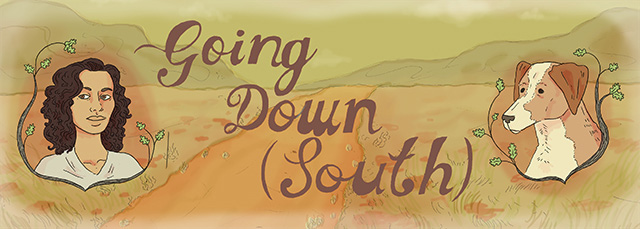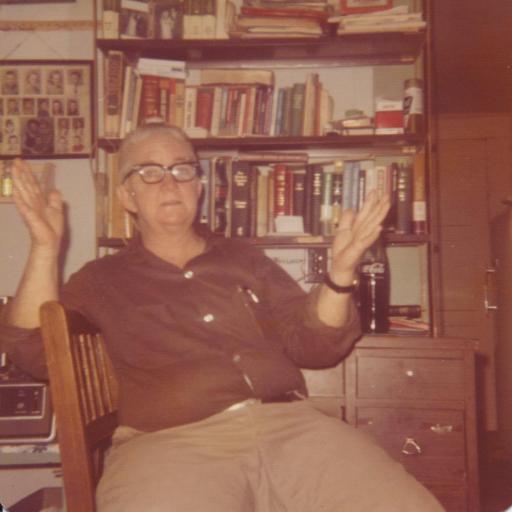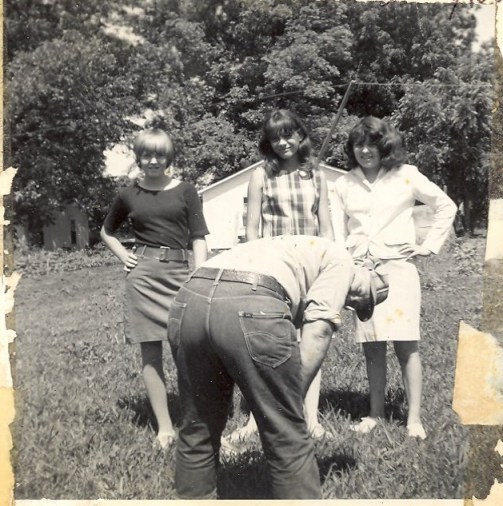Going Down (South) is a regular column about y’all being a gender neutral pronoun, how red states are actually more of a purplish color, boiled peanuts, and the trials and tribulations of being a rural homo — with an emphasis on the tribbing.

Header by Rosa Middleton
For the last three years, Oregonian staffer Casey Parks and cinematographer Aubree Bernier-Clarke have been traveling to rural Louisiana in search of answers about an old Parks’ family friend, Roy Hudgins. In doing so, they’ve dismantled a lot of preconceived notions and stereotypes about Southerners, queers, and acceptance.
No one really knows how Hudgins wound up in Delhi (population: 2,951), but there are plenty of tall tales and wild guesses, as is to be expected in a small town. Hudgins was kidnapped as a child. Hudgins was left in a shoebox on the front steps of a church. Hudgins was a traveling country music songwriter.

The unknown did not stop there. Mere days before she died, Hudgins’ mother told Parks’ great-grandmother that Roy was “as much a woman” as she was. “Allegedly, that was the first that anyone knew that Roy was not born male-bodied. In the years that followed, word got around town that Roy was different. A story we hear frequently was that Roy was a morphodite–that’s Louisianan for hermaphrodite,” Bernier-Clarke told me. The rumor spread gradually in the years following Mrs. Hudgins’ death, yet did not deter Delhians from letting Hudgins mow their lawns and even look after their children. Despite being of ambiguous gender and sexuality, Hudgins managed to live a seemingly content life in one of America’s most conservative states. “Roy was universally accepted,” Bernier-Clarke said. Hudgins passed away in 2006.
When I first watched the Kickstarter campaign video for Parks’ and Bernier-Clarke’s for Diary of a Misfit: The Roy Hudgins Story, I found myself growing nostalgic for trailer parks and overgrown grass in the exact same way I did when the rooster crowed at the beginning of Southern Comfort.
***
Home is where the heart is. Growing up, it wasn’t just a saying but a literalism. It was painted on a wood placard and nailed onto the front porch of my parents’ house. It’s still there, even though my definition of “home” has evolved into something much more abstract than lakeside home in Georgia. For me, home is the vague place where queer and Dixie overlap, often uncomfortably. This is why I’m constantly chasing after other Southern-reared queers; the kind who also had “Home Is Where The Heart Is” wood- or needlework somewhere in their childhood homes; who understand what Allison meant when she wrote, We claim our heritage with a full appreciation of how often it has been disdained; whose bodies are familiar with manual labor; the kind with at least one family recipe that is not a secret but a national treasure which is shown off whenever the opportunity to entertain presents itself.

I know that we exist by the barrelful. If I ever meet you and catch the slightest hint of an accent or SEC t-shirt, I’m likely to flip out in the best of ways and bombard you with a thousand personal questions. Because that’s what happens when someone feels like home to me: I say so much–too much–so quickly and with so much unconscious honesty that upon realizing what I’m doing, I immediately want to snatch my words out of your ear canal and gulp them all back down until they’re safe and sound inside of my ribcage. But if I notice that you’re also flailing between similar Southern states of oversharing and self-consciousness, I’ll shrug and continue right along, inquiring and drawing parallels like my life depends on it.
Because it does.
***
With roots in Louisiana and Kentucky, Parks and Bernier-Clarke also feel like home to me. Queer Southerners tend to be acutely aware of the nuances of coming out and staying out. Often, being living openly results in an odd mix of unspoken loyalty, turned blind eyes, and even unanticipated community from others. As evidenced by Roy Hudgins and even yours truly, rarely is coming out in a rural place as cut and dry as being completely embraced or completely rejected. “I think there is a sense of loyalty in most small towns. Kind of like family. It’s okay for me to pick on my younger sibling, but if an outsider tries it, I’d fuck them up,” said Brenier-Clarke.
But while Hudgins was accepted by Delhians, it seems to have only gone so far. The filmmakers are still searching for those who might know about Hudgins’ romantic desires or relationships. “From what I’ve gathered, Roy does seem a bit asexualized by the population. I have a feeling that people in Delhi are curious about Roy’s romantic life, but at the same time might’ve not taken too kindly to it were it something made public while Roy was still alive.” Whether or not Hudgins felt isolated or fulfilled remains unknown, but some of his old possessions may provide clues. “We know that Roy kept journals. In fact, Roy’s neighbor told us that Roy had written Diary of a Misfit across the journal’s front cover. If we could get a hold of those, I think they could answer a lot of questions.”

Roy Hudgins matters because the questions surrounding his life have connected two unlikely generations of Southerners in the pursuit of the same goal. “It is interesting how natural Casey’s grandma is on camera. Her family is very close, so I think that helps, but also I think she doesn’t really feel like she has anything to lose at this point. Also, she really believes in us and the project. She wants us to solve the mystery, so she’s willing to do whatever she can to help.”
When talking with Brenier-Clark, I found myself becoming just as invested in the narrative surrounding Parks and her grandmother as I was in Hudgins’ ambiguities. “Casey’s grandma first told her about Roy at a time when Casey was first coming to terms with her sexuality, and she couldn’t believe that someone could be so loved in a situation similar to the one that made her feel so alienated,” Brenier-Clarke said.
These days, however, Parks isn’t the only queer in Dehli, Louisiana. “There are a lot of short-haired low-maintenance women in small towns in the South, so to a certain extent we might not register as anything special. But, of course some people who are more clued in have hinted. One woman pulled up in her Jeep after overhearing us talk about this at a coffee shop. She kind of winked at us and asked if we were interested in Roy for ‘personal reasons.’”








Comments
This column!! I am happy stories like these are being told, because as much as I find myself hating on Kentucky and the American South for what advances we haven’t made I still think there is a different cultural climate that isn’t always black and white and cold, but also maybe lukewarm and rainbow. Also warm SEC feels!!
I love these articles so much! thanks for writing them! yay for southern queers! People who aren’t from the South (and some people from the South) always give me weird looks/comments when I tell them I want to stay in NC.
“Short-haired low-maintenance women” –> they are definitely not seeing troughs full of queers then. We are really good at hiding everywhere if we want (need) too. But that shows they are also not looking.
However, asking someone if they are interested in something gay for “personal reasons” ranks as one of the Best Pick-up Lines Ever. I love the South – if we think it or want to know it, we just say it. No high-falutin’ beating around the bush – if there’s a point in that bush, we will always tell you right where it is.
“…if there’s a point in that bush, we will always tell you right where it is.”
I feel like every good queer lady should be willing to step up and warn other queer ladies about points in bushes. Safety first!
I recently came to Arkansas for school. It’s quite the culture shock. If I were Roy, I would have left too!
I moved to Arkansas this summer for school as well. Coming from Kansas I didn’t think it’d be that different. OMG! Was I ever wrong. Culture shock indeed.
LOVE this. The whole video yanked my heartstrings all the way to the goosebumps on my arm, then snapped them back so hard it still hurts.
I want that grandma to have whatever knowledge she can have, as soon as possible, because she deserves it.
I wish I had arms big enough to HUG THE CRAP out of all queers and “outsiders” and grandmas and short-haired low-maintenance women. I love you all! Support the crap out of this Kickstarter campaign!!
“We claim our heritage with a full appreciation of how often it has been disdained; whose bodies are familiar with manual labor; the kind with at least one family recipe that is not a secret but a national treasure which is shown off whenever the opportunity to entertain presents itself.”
Despite being from the frozen hinterlands of Canada, this quote really resonated with me. I don’t know if non-Canadians know this, but Winnipeg is a pretty stigmatized place to come from. Until recently, we were the murder capital of Canada, our unofficial provincial drink is a chemical slushie that can be had for less than a dollar at a specific chain of convenience store, and we have a reputation as racist, backward, drunken and poor (and full of Natives, Canada’s most popularly hated racial group). While living in Ottawa, I once had someone ask me upon hearing my city of origin if I’d ever seen someone get stabbed, and if I carried a knife.
Despite this, Winnipeg (at least the south end) is the biggest small town you’ve ever lived in. Upon meeting a new person, the conversation immediately turns to what and who we you have in common, because you’re guarunteed to know a friend of their aunt or go to the same dentist or have been on rival ringette teams. After that you start talking about how it’s way too cold/hot outside, because the weather in Winnipeg is never ever comfortable.
All of this to say, that I feel like I have had similar experiences and I imagine that I have almost the same appreciation of this column as someone who is actually from the South
I’ve never been stigmatized for being from Winnipeg, but maybe that’s because I moved to Edmonton (which is the same kind of city-feel).
But yeah. Obviously the second part is right, since we kept playing the “who do you know??” game on the bus to A Camp =P
That’s true- I’ve never had an issue in Edmonton, but maybe that’s because they’re our prairie siblings. Out east I’ve definitely encountered weird negative stereotypes, and also in BC and the Yukon
Ahhhh, so excited for this! <3
I’m a southern queer, living on the Gulf Coast of MS, right in between New Orleans and Mobile. I find that I am always torn between wanting to leave and wanting to stay. I have lived in and all around the south and Chicago too, but I always seem to find my way back to the small town that cradled me as in infant. The south, with our sweet tea and slow southern drawls, are a security blanket and no matter where I go or how long I stay when I say ‘home’ I am always referring to small town that I grew up in. The place where my family has lived there entire lives and everyone knows who you are.
The South is a place that gets into your blood and while I have plans to live in NY or perhaps Seattle after school, in the back of my mind I always see myself being 80 years old, sitting on a porch swing with a woman I have spent 50 years with, watching the sun set behind the magnolia trees.
It may all be a bit romanticized, but no matter where I end up, part of me will always remain in the South.
Fonseca, you always make my Grinch-like heart swell with a mixture of sadness and pride.
I have such mixed feelings about this film. On the one hand, I believe that unearthing queer (or in this case, trans/genderqueer?) stories and sharing them with younger generations has immense power. Valuable, positive power. Visibility is life-saving in my opinion.
However, on the other hand, what if Roy didn’t/doesn’t want his/their history unearthed? Searching for Roy’s journals and private history concerns me, as it could possibly disrespect his wishes or desire for privacy. That would be sad, if it was true.
So many complicated feelings!
Right now I’m living in the deep south of Georgia in a very small town and it is so difficult. It’s actually the reason why I’m still in the closet (I will be moving next year though because I’m transferring schools). I’m in college so the topic of homosexuality is brought up a lot in my philosophy/ethics classes and my psychology classes and it is always painful to hear just the ignorance from so people, including professors sometimes. I do like these articles though because while I hate living where I am now, I still miss the small town in North Carolina where I grew up. It makes no sense because it is just as conservative there as it is here but it just feels like home. I can’t change my roots or break the connection with a place that is still home to most of my family. It makes matters even more complicated when some of the people I respect the most (my grandmother, great-grandmother) represent the same ignorant homophobic mentality that is alienating me from people in Georgia.
I have nothing to do with the South, why am I so interested in like… all… your writings on the subject?
i also have nothing to do with the south (have never even stepped foot in a southern state!) and yet i, too, find myself FASCINATED with fonseca’s writing. i think it’s because she’s really really really good.
There really is this weird brand of acceptance we do for queer people in the South. It’s kind of like when you come out and your mom pretends not to hear you. Like, everyone might know that you’re a chick who sleeps with other women, but they are NEVER going to say it. It’s not that they’re denying it exists, because deep down they know, it’s just easier to not talk about it (as is the case with SO MANY THINGS in the South). I look back at my childhood and my church and my extended family and can pinpoint so many queer people – the therapist my whole family has been to, who saved my life when I started seeing her at age 10; an older male cousin who moved to Tennessee to no doubt live his life a bit removed from the watchful eye of his very Christian mother, but who I am certain probably called her every day; the slightly effeminate bachelors at church who were friends with my aunts. We never talked about them being “different,” though. It’s kind of easy to accept that warm, comfortable status, of not being out but being accepted, as long as you don’t get too irate about not being able to talk about your life or bring a significant other to a pitch-in dinner. And because a lot of Southerners apply that policy of “don’t ask, don’t tell” to most things in their life that slightly stink of sin – the pastor’s affairs, the worship leader sleeping with his best friend’s wife, your aunt’s first husband, the time your grandpa was married for a week before he got it annulled – it’s not far-fetched that you might not feel singled out because of your homosexuality because everyone has their secrets and they’re all treated the same way.
I love the idea for this column. More please!
I grew up in Montgomery, AL, and I’m currently bumming around Tuscaloosa. One of my majors is American studies; the department regularly offers both Southern Studies and Queer Culture courses, so that intersection definitely gets consideration here.
I don’t know about y’all, but for me, my identity is, above all else, Southern. After that I’m a mulatto, then a libertarian… queer (being the most recently claimed) falls somewhere in there too, I suppose. Neat column; I look forward to future pieces.
Also, because it must be said, roll tide.